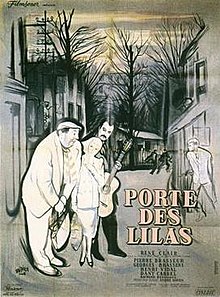Gates of Paris (film)
| Porte des Lilas Gates of Paris | |
|---|---|
 | |
| Directed by | René Clair |
| Written by | Novel: René Fallet Screenplay: René Clair Jean Aurel |
| Produced by | René Clair André Daven |
| Starring | Pierre Brasseur Georges Brassens Henri Vidal Dany Carrel |
| Cinematography | Robert Lefebvre |
| Edited by | Louisette Hautecoeur |
| Music by | Georges Brassens |
| Distributed by | Cinédis (France) Lopert Pictures Corporation (U.S.) |
Release dates |
|
Running time | 95 minutes |
| Countries | France Italy |
| Language | French |
Porte des Lilas (English: Gate of Lilacs) is a 1957 French-Italian dramatic film directed by René Clair, based on René Fallet's novel La Grande Ceinture. The film is known as both Gates of Lilacs and The Gates of Paris, but was released under the latter title in the United States.[1]
Plot[edit]
Pierre Barbier, a convicted criminal accused of murder but also hungry and sick, wanted by the police, finds refuge with a kind-hearted boy known as "The Artist." This unexpected arrival disrupts the lives of three inhabitants of the working-class neighborhood of Porte des Lilas in eastern Paris. First, there's the Artist, who struggles with the presence of the outlaw in his home but tries to help him get proper documentation. Then there's Juju, a lazy, alcoholic man who admires Pierre Barbier. Lastly, there's young Maria, who suspects a secret and sneaks into the Artist's house to find Barbier. He deceives her in a vile manner, which infuriates Juju, who is in love with Maria. In the end, Juju commits a crime by killing the man who ruined his dreams.
Cast[edit]
- Pierre Brasseur as Juju
- Georges Brassens as Artiste
- Henri Vidal as Pierre Barbier
- Dany Carrel as Maria
- Raymond Bussières as Alphonse
- Gabrielle Fontan as Madame Sabatier
- Amédée as Paulo - a regular at the café
- Annette Poivre as Nénette
- Alain Bouvette as Paulo's friend
- Alice Tissot as the concierge
- Paul Préboist
Awards[edit]
The film was nominated for the Academy Award for Best Foreign Language Film[2] and a BAFTA Award in 1958 and won the Bodil Award for Best European Film.
See also[edit]
- List of submissions to the 30th Academy Awards for Best Foreign Language Film
- List of French submissions for the Academy Award for Best Foreign Language Film
References[edit]
- ^ According to Ronald Bergan and Robyn Karney in the Bloomsbury Foreign Film Guide (London: Bloomsbury, 1988, p. 224) and Melissa E. Biggs (French Films, 1945–1993, Jefferson, NC: McFarland, 1996, p. 221) the film has these two alternate English titles. The English title used on the original British release is unclear.
- ^ "The 30th Academy Awards (1958) Nominees and Winners". oscars.org. Retrieved 2011-10-25.
External links[edit]
